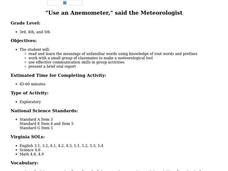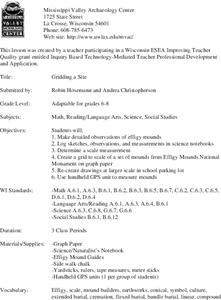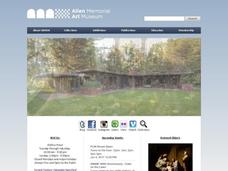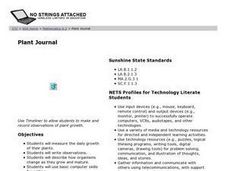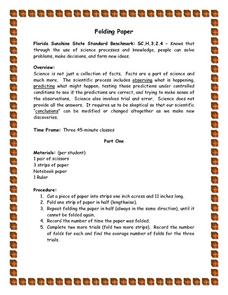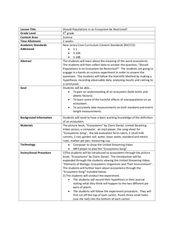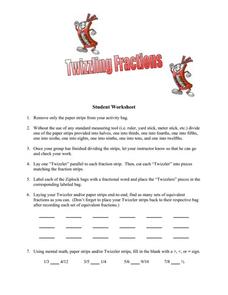Curated OER
"Use an Anemometer," said the Meteorologist
Pupils work in groups to make an instrument the Meteorologists use to measure the speed of the wind after the teacher reads them a poem about the wind. Students then review vocabulary that they studied from their lesson.
Curated OER
The Box with the Greatest Volume
Pupils use measurement tools to measure the nearest 16th of an inch. They connect fractions and their decimal equivalents and compare this with other decimals. Finally, the class uses algebraic concepts and formulas to solve problems.
Curated OER
Rotary Cutting
Students discover how to safely use a rotary cutter, mat, and ruler. They examine the parts of the fabric and assess the difference between a finished block and a cut block. They identify bed covers and pillows and explore the world of...
Curated OER
Wood Identification Based on Density
Eighth graders measure irregular and regular shaped solids. In this investigative lesson students calculator volume, mass and density of wood and blocks.
Curated OER
Brine Shrimp Feeding
Third graders study the diet of the brine shrimp. This is an introduction to a math measurement of a micrometer because of the size of the food brine shrimp feed upon. They make predictions about the types of food shrimp eat based on...
Curated OER
Gridding a Site
Learners make observations of effigy mounds and record them in a notebook. In groups, they must determine the scale of measurement and create their own grid to scale part of the Effigy Mounds National Monument. They also practice using...
Curated OER
Just a Little Bit
Second graders read the book, "Just a Little Bit" and work in groups weighing the same object with a scale. They then get a different unit of measurement, like paper clips, cotton balls, washers, or pennies and then figure out and record...
Curated OER
Andromeda's Scale
Students perform a classroom activity of measuring the angular size of something from several distances. On the Internet, they obtain and examine images with various magnification factors and estimate the angular size of Andromeda.
Curated OER
Simple Machines/Technology
Third graders examine the concept of work as the movement of an object through a distance. They define gravity and determine what type of work is caused by gravity. They measure how far an object is moved by a force. They make a...
Curated OER
Chinese New Year: Paper Lanterns
First graders study the celebrations of Chinese New Year. They practice measuring and cutting to make paper lanterns.
Curated OER
A Cosmic Cafeteria
Students indentify and differentiate between transit and surface food systems. Students measure energy that is released by various foods. Students compare and contrast cooking with solar energy on earth and what they might have learned...
Curated OER
Plant Journal
Young scholars measure the daily growth of plants in this technology-based science lesson plan that uses Timeliner to record student data. The lesson plan allows students practice at basic computer skills (typing/data entry).
Curated OER
Math: a World of Symmetry
Learners expand their knowledge of quadrilaterals and identify basic symmetrical forms. Over three weeks, they explore the math, application, and discussion of symmetry. After conducting Internet research, students create symmetrical...
Curated OER
Make a Dinosaur
Students estimate the size of dinosaurs and create a dinosaur model. They create bar graphs of the sizes of dinosaurs one in meters and the other in "student" units. They draw a pictures and add words or sentences about their dinosaur.
Curated OER
Folding Paper
Learners use the scientific process and their knowledge to obeserve, predict, and test their predictions under controlled conditions to verify their predictions and then make sense of these predictions. They also graph, write...
Curated OER
Elastic Forces
Third graders predict and experiment to discover the amount of force exerted by a stretched elastic band. They construct a spreadsheet and make a bar graph showing the results of their experiment.
Curated OER
Learning the Letters
Students identify the letters of the alphabet. In this letters lesson, students use an iPad to play games, draw pictures, and listen to videos about the alphabet. They use pipe cleaners to create their name.
Curated OER
Should Populations in an Ecosystem be Restricted?
Fourth graders experiment to determine how overpopulation effects ecosystems specifically plants. In this ecosystem lesson, 4th graders conduct an ecosystems experiment after listening to Claire Daniel's, Ecosystems. They watch a video,...
Curated OER
Twizzling Fractions
In this fraction worksheet, students use twizzlers to demonstrate various equivalent fractions. Students complete ten greater than, equal to, and less than questions.
Curated OER
Tiling Tessellations
Young scholars explore tessellations. In this shapes and geometry lesson, students describe the attributes of many of the shapes displayed on an Elmo. Young scholars create examples of tessellations using pattern blocks.
NASA
Pop Can Hero Engine
Hang a soda can from a string and watch it spin by the force created by water streaming out of slanted holes. This plan provides background information, detailed materials and procedures, discussion questions, a lab worksheet, and...
Cornell University
Non-Newtonian Fluids—How Slow Can You Go?
Children enjoy playing with silly putty, but it provides more than just fun. Young scientists make their own silly putty using different recipes. After a bit of fun, they test and graph the viscosity of each.
Curated OER
Seeing is Believing - Or Is It?
Here is a great science lesson. It extends the concept of vision into the area of optical illusions, perspective, and tessellation. This well-designed plan has tons of great activities, utilizes interesting video, and should lead to a...
Curated OER
What Is Hyperbolic Geometry?
Ninth graders discuss the concept of hyperbolic geometry. They complete Internet geometry activities and write essays comparing and contrasting hyperbolic geometry to Euclidean geometry.


